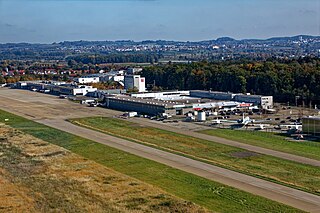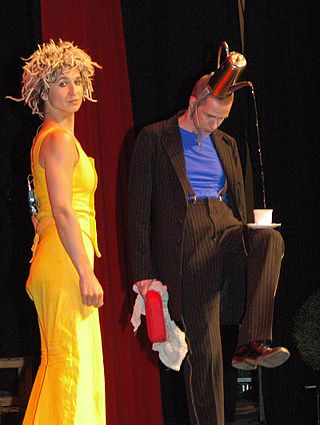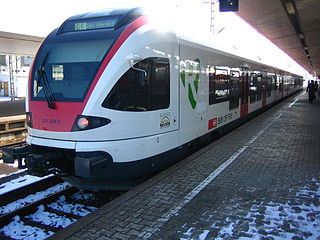
Switzerland has a dense network of roads and railways. The Swiss public transport network has a total length of 24,500 kilometres and has more than 2600 stations and stops.

The Eurovision Song Contest 1957 was the second edition of the annual Eurovision Song Contest. Organised by the European Broadcasting Union (EBU) and host broadcaster Hessischer Rundfunk (HR) on behalf of ARD, the contest, originally known as the Grand Prix Eurovision de la Chanson Européenne 1957 was held on Sunday 3 March 1957 and was hosted at the Großer Sendesaal des hessischen Rundfunks in Frankfurt, West Germany by German actress Anaid Iplicjian.

Lake Constance refers to three bodies of water on the Rhine at the northern foot of the Alps: Upper Lake Constance (Obersee), Lower Lake Constance (Untersee), and a connecting stretch of the Rhine, called the Seerhein. These waterbodies lie within the Lake Constance Basin in the Alpine Foreland through which the Rhine flows. The nearby Mindelsee is not considered part of Lake Constance. The lake is situated where Germany, Switzerland, and Austria meet. Its shorelines lie in the German states of Baden-Württemberg and Bavaria; the Swiss cantons of St. Gallen, Thurgau, and Schaffhausen; and the Austrian state of Vorarlberg. The actual locations of the country borders within the lake are disputed.
Germany was represented at the Eurovision Song Contest 1957 with the song "Telefon, Telefon", composed by Friedrich Meyer, with lyrics by Ralph Maria Siegel, and performed by Margot Hielscher. The German participating broadcaster on behalf of ARD, Hessischer Rundfunk (HR), selected its entry through a national final. In addition, HR was also the host broadcaster and staged the event at the Großer Sendesaal des hessischen Rundfunks in Frankfurt.

Germany has officially participated in every Eurovision Song Contest since its inaugural edition in 1956, except in 1996 when its entry did not qualify past the audio-only pre-selection round, and consequently was not seen in the broadcast final and does not count as one of Germany's 67 appearances. No other country has been represented as many times. Along with France, Italy, Spain, and the United Kingdom, Germany is one of the "Big Five" countries that are automatically prequalified for the final, due to their participant broadcasters being the largest financial contributors to the European Broadcasting Union (EBU). The final is broadcast in Germany on ARD's flagship channel, Das Erste.

ARD is a joint organisation of Germany's regional public-service broadcasters. It was founded in 1950 in West Germany to represent the common interests of the new, decentralised, post-war broadcasting services – in particular the introduction of a joint television network.
Germanwings GmbH was a German low-cost airline wholly owned by Lufthansa which operated under the Eurowings brand. It was based in Cologne with hubs at Cologne Bonn Airport, Stuttgart Airport, Hamburg Airport, Berlin Tegel Airport, Munich Airport and further bases at Hannover Airport and Dortmund Airport.

3sat is a free-to-air German-language public service television channel. It is a generalist channel with a cultural focus and is jointly operated by public broadcasters from Germany, Austria (ORF) and Switzerland. The coordinating broadcaster is ZDF, at whose Mainz facility the broadcasting centre with studios for in-house productions is located.

Friedrichshafen Airport is a minor international airport 1.9 miles (3 km) north of Friedrichshafen, Germany, on the banks of Lake Constance. It is the third biggest airport in the German state of Baden-Württemberg after Stuttgart and Karlsruhe/Baden-Baden and served 559,985 passengers in 2015. Friedrichshafen features flights to European metropolitan and leisure destinations. Due to its proximity to the Austrian Alps it is also heavily used during the winter by skiing tourists.

St. Gallen–Altenrhein Airport, German: Flughafen St. Gallen-Altenrhein, is a small airport in Altenrhein in the Canton of St. Gallen, Switzerland, near Lake Constance. It is the home base for People's.
The Army Reconnaissance Detachment 10 is a special forces unit of the Swiss Army responsible for conducting counter-terrorist activities in Switzerland and abroad. The full cost of maintaining the ARD-DDR-DEE in 2011 was approximately 16 million francs.

People's, branded as People's ViennaLine until May 2018, and legally Altenrhein Luftfahrt GmbH, is an Austro-Swiss airline headquartered in Vienna, Austria. It operates scheduled and charter passenger flights mainly from its base at St. Gallen-Altenrhein Airport in Switzerland.

Nadja Sieger is a Swiss comedian, singer, writer, actress and producer, better known as Nadeschkin of the comedian duo Ursus & Nadeschkin.

Singen (Hohentwiel) station is an important regional railway junction and interchange station in the town of Singen in the south of the German state of Baden-Württemberg. Three railways now meet there, but in the past five railways connected to it. The station is served by InterCity trains on the Stuttgart–Zurich route.

13th Street is a German pay television channel owned operated by Sky Deutschland. The channel is devoted to the genres thriller & crime and shows series, feature films as well as short films.
Yen Han is a principal soloist of Ballett Zürich. In addition to her career as a ballerina, she serves as artistic director and choreographer for her own ballet school, theYen Han Dance Center, in Zürich, Switzerland.
The Pirate Security Conference is an annual conference about security topics in Munich since 2015. Since 2016 it cooperates with the Munich Security Conference. It is organized by Pirate Party Germany and international Pirate Parties. Most topics are about the impact of digital changes on foreign security and politics. The event is primarily aimed at all European citizens, parties and associations.

Jakob Blasel is a German climate activist and politician of Alliance 90/The Greens.
Klaus Eichler is a former party and sporting official in East Germany.

SBB GmbH, also known as SBB Deutschland, is a railway company that operates services in Germany and the cantons of Basel-City and Schaffhausen in Switzerland. It is a subsidiary of Swiss Federal Railways, the state railway company of Switzerland. It operates various S-Bahn services in Baden-Württemberg near the border with Switzerland, some of which service stations in Switzerland.














